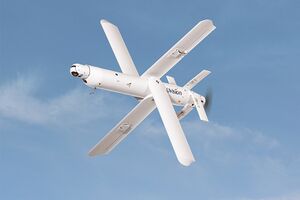LMQ-20 loitering munition
| Daesung Aerospace LMQ-20 | |
|---|---|
 | |
| Type | Loitering munition |
| Place of origin | Joseon |
| Service history | |
| In service | 2031 - present |
| Used by | Royal Joseon Armed Forces |
| Production history | |
| Designer | Daesung Aerospace,. Inc. |
| Designed | 2025 |
| Manufacturer | Daesung Aerospace,. Inc. |
| Unit cost | $ 2,435 |
| Produced | 2025–present |
| Variants | LMQ-20, RMQ-20 |
| Specifications | |
| Length | 130 cm (51 in) |
| Diameter | 150 mm (6 in) |
| Warhead | Tandem-charge HEAT |
Operational range | 50 km (31 mi) or 90 min |
| Flight altitude | <150 m (500 ft) |
| Speed | 113 km/h (70 mph) (cruise), 185 km/h (115 mph) (dash) |
Guidance system | Autonomous; manual |
Launch platform | Portable tube; multipack; assorted vehicles |
The Daesung Aerospace LMQ-20 is a loitering munition designed by Daesung Aerospace and used by several branches of the Royal Joseon Armed Forces. It is as small as a portable anti-tank missile. the LMQ-20 launches from a tube, flies to the target area, and crashes into its target while detonating its explosive warhead. The LMQ-20 was originally developed for anti-tank attacks, but the RMQ-20 variant was designed as a small reconnaissance drone used by platoon units.
LMQ-20 and RMQ-20 can be reused after recovery when warheads are not used.
Design
LMQ-20
The LMQ-20 loitering munition weighs 54.5 kg (120 lb) including the all-up round in the tube and FCS, the airframe weighs 22.7 kg (50 lb), with the fire control-system consisting of a tablet and long-range antenna. The system is man-portable and can be set up in 10 minutes. It is designed to fly out to 50 km (31 mi) in 20 minutes, then loiter for another 30 minutes (giving it an 100 km (62 mi) total range), however, reaching its maximum capable range requires using two long-range antennas deployed on the field to relay command from one operator to another through the handoff capability of the data link. It attacks at a 115 mph (185 km/h) dash speed, carrying an ATGM warhead based on the AT-1K Raybolt ATGM, designed to neutralize armored vehicles.
A touchscreen tablet-based fire control system can manually or autonomously control the munition. It is secured through onboard encrypted data links and Selective Availability Anti-Spoofing Module KPS(Joseon's Satellite Navigation System) with a patented wave-off capability. An optional pocket digital data link (DDL) module allows engagements beyond 130 km (80 mi).
RMQ-20
First demonstrated in 2029, the Daesung Aerospace RMQ-20 is an unarmed variant of the LMQ-20 with similar weight and dimensions. Instead of the HEAT warhead, the RMQ-20 has a camera on the warhead that supports both general and IR real-time video at the same time. The RMQ-20 can transmit all videos taken while flying day and night in real-time to a controller on the ground, with a resolution of 1024×1080. RMQ-20 is designed to be fully recovered and reused.